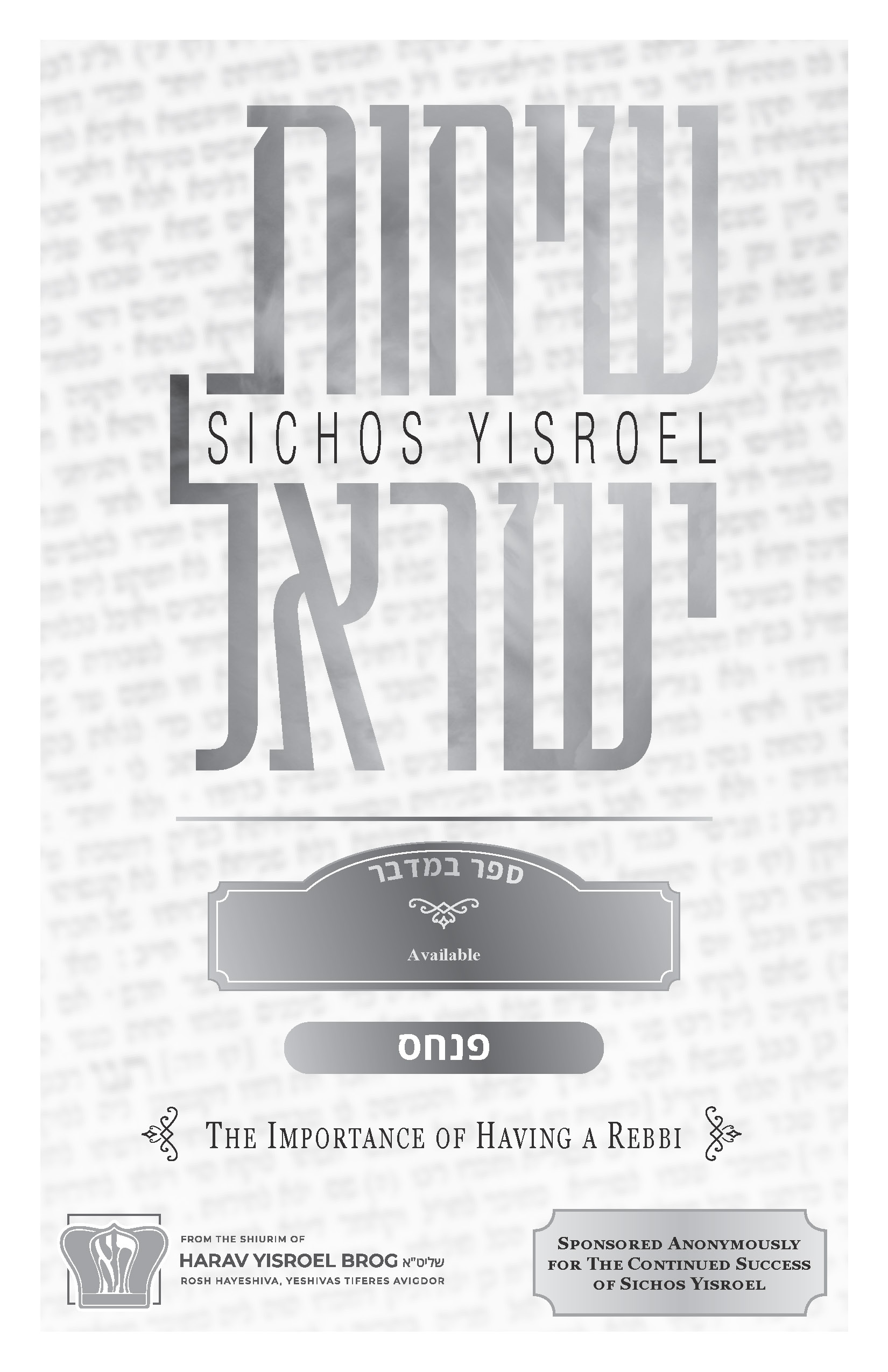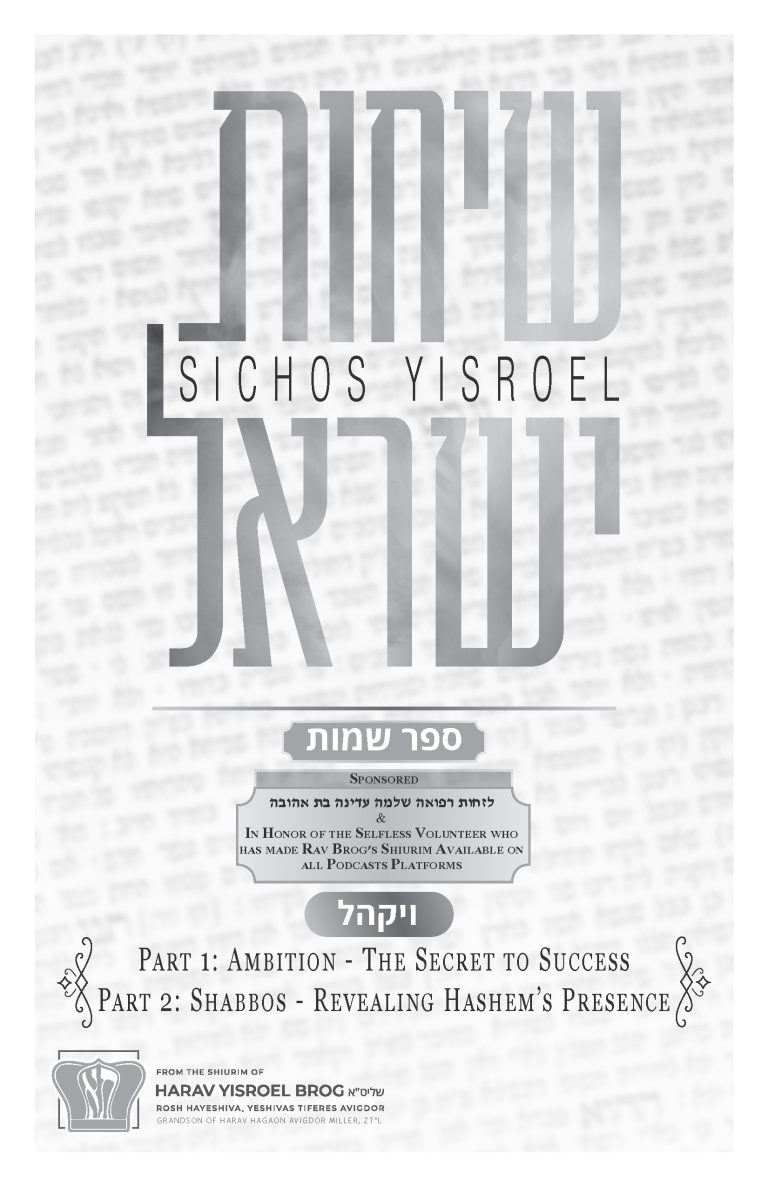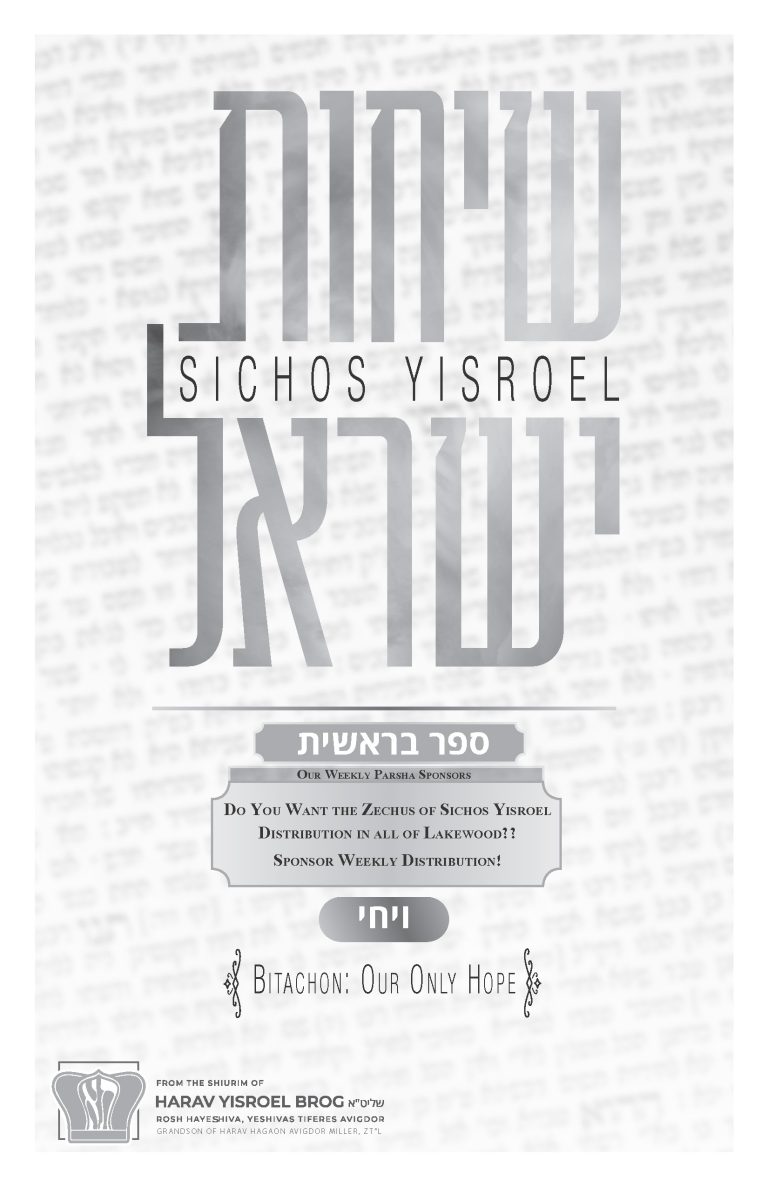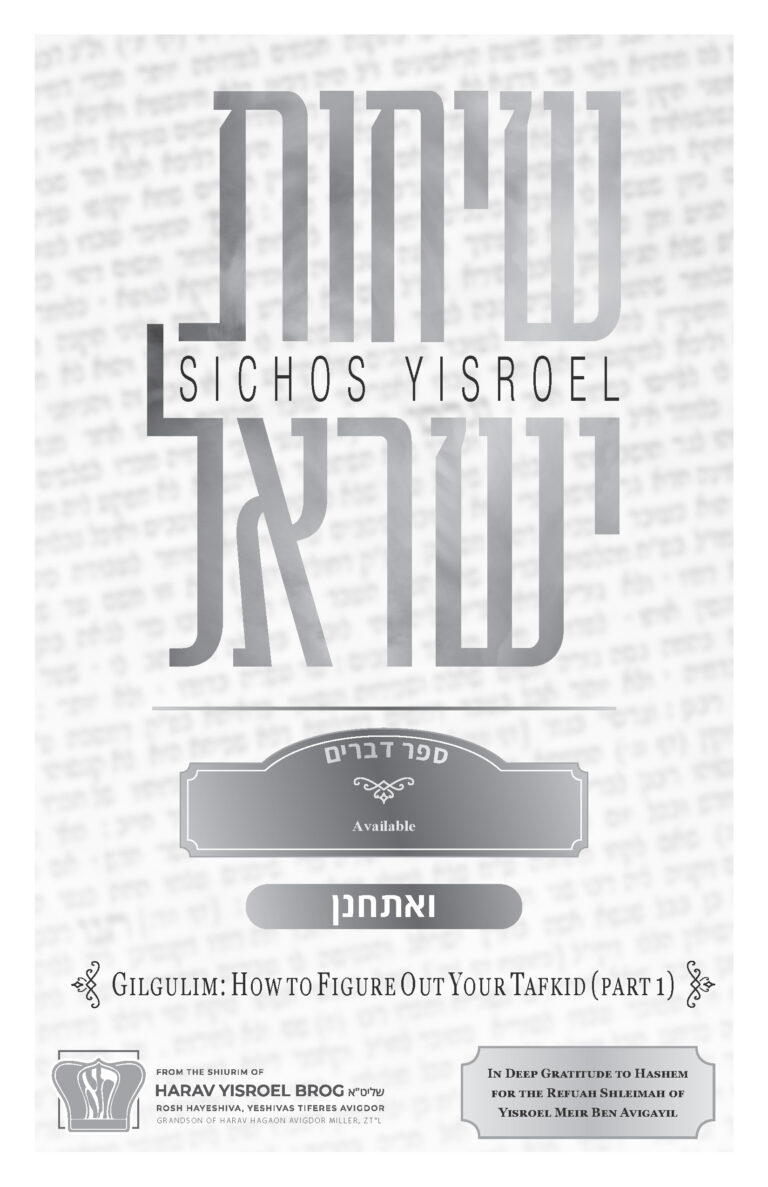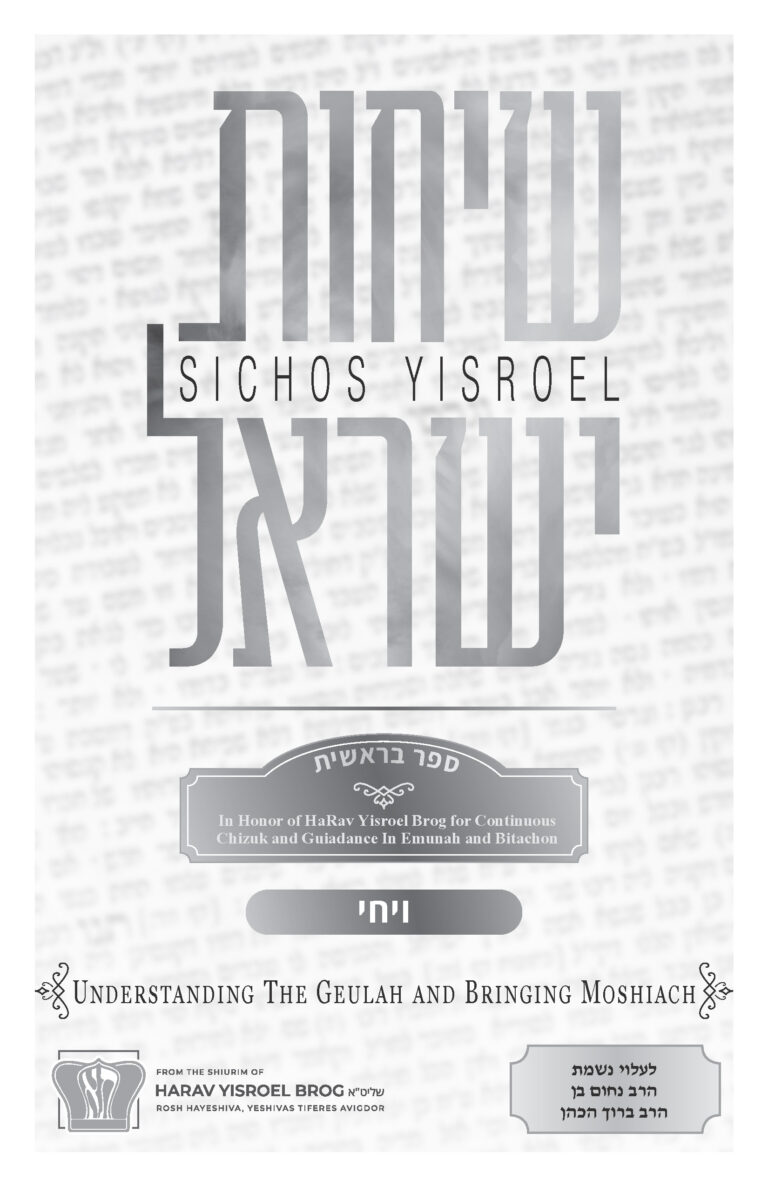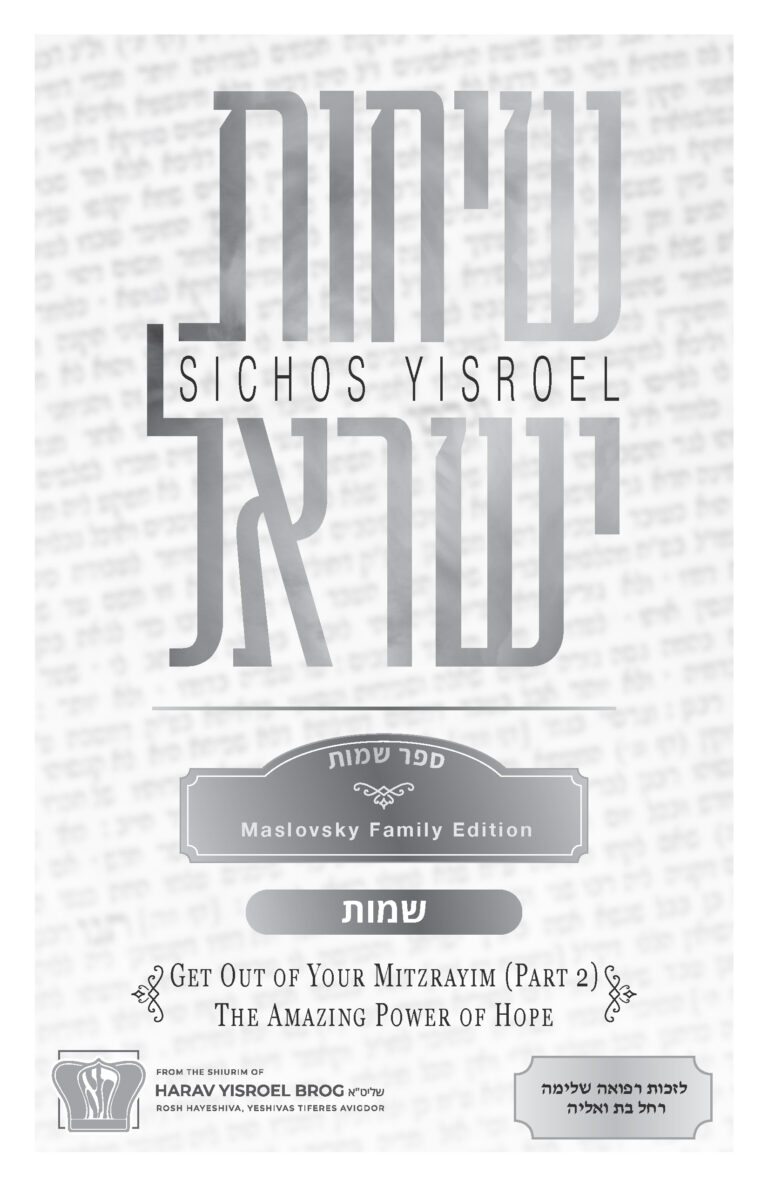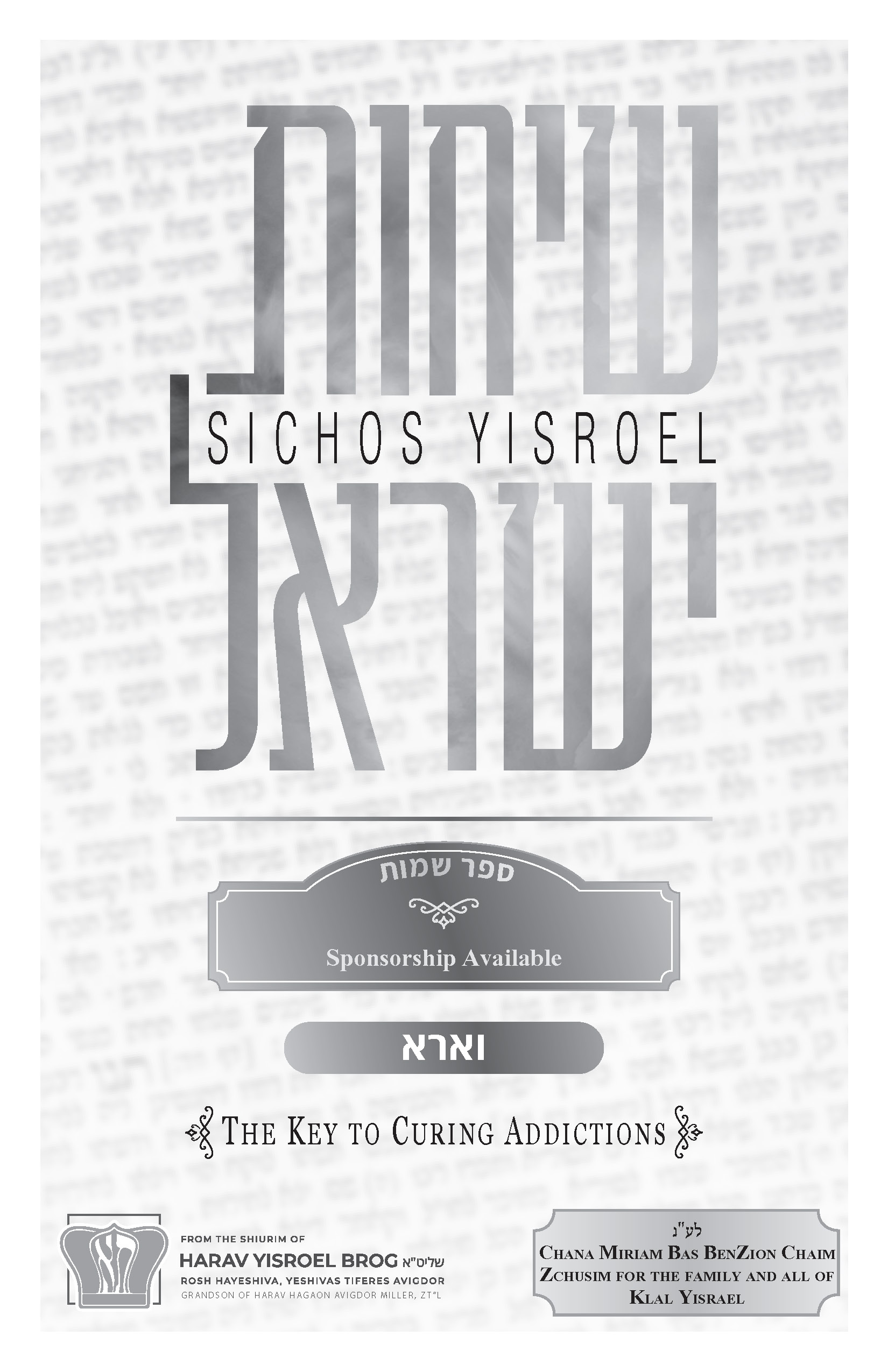Pinchas 5783: The Importance of Having a Rebbi
Sponsored
Sponsored Anonymously for The Continued Success of Sichos Yisroel
Consider sponsoring a shiur
Visit YTATorah.org
Shiur presented in 5773
How Yehoshua was Appointed to be Leader
The parshah talks about the appointment of Yehoshua. The Torah says (Bamidbar 27:18):
וַיֹּאמֶר ה’ אֶל מֹשֶׁה קַח לְךָ אֶת יְהוֹשֻׁעַ בִּן נוּן אִישׁ אֲשֶׁר רוּחַ בּוֹ וְסָמַכְתָּ אֶת יָדְךָ עָלָיו.
“And Hashem said to Moshe, ‘Take for yourself Yehoshua son of Nun, an inspired man, and lay your hand upon him.’”
What does, קַח לְךָ, take for yourself, mean? Rashi explains, קָחֶנּוּ בִּדְבָרִים , take him with words. Draw him in convince him and say to him, אַשְׁרֶךָ שֶׁזָּכִיתָ לְהַנְהִיג בָּנָיו שֶׁל מָקוֹם, fortunate are you that you are zocheh to be manhig the children of Hashem.
You should know, there are many people who receive an opportunity to be mezakeh Klal Yisrael in different ways, and for whatever reason, they choose to bow out and say, “I don’t really want this. I’m overwhelmed. I’m afraid.” There are all kinds of stories. There is such a metzius.
You’d think that when somebody is offered a position to become the leader of Klal Yisrael and take over Moshe Rabeinu’s position, he should be excited. But Yehoshua was a little overwhelmed at the responsibility. It was not because he was lazy, or because he was afraid that this life changing opportunity would deprive him of the relaxation and the pursuit of some of his hobbies. No. He was overwhelmed because he understood hisresponsibility. “Tell Yehoshua as follows,” Hashem said to Moshe, אַשְׁרֶךָ שֶׁזָּכִיתָ לְהַנְהִיג בָּנָיו שֶׁל מָקוֹם – “fortunate are you, that you merited to guide My children.”
Now, we have to learn from this. This is an instruction. Whatever naaranim (fools)are going to tell you otherwise: “What do you need this for? It’s such a big responsibility,” or ahin and aher – when Hashem is giving you an opportunity, you seize it.
Then it says לְךָ. What does that mean? Zogt Rashi, אֶת שֶׁבָּדוּק לְךָ, אֶת שֶׁאַתָּה מַכִּיר. That means to say, Hashem is saying, “We’re not fooling him. We’re not ‘selling’ him a sales job. You know and I know that he is fit for the position.”
And it says, what is his name? אֶת יְהוֹשֻׁעַ בִּן נוּן אִישׁ אֲשֶׁר רוּחַ בּוֹ. What does that mean, a man אֲשֶׁר רוּחַ בּוֹ? Rashi explains, כַּאֲשֶׁר שָׁאַלְתָּ שֶׁיּוּכַל לַהֲלֹךְ כְּנֶגֶד רוּחוֹ שֶׁל כָּל אֶחָד וְאֶחָד – Hashem said, “You asked me for a manhig who knows how to deal with all different types of people and he knows how not to lose it.” That is the first yesod of a leader. A leader of a group has to be an ish asher ruach bo. It is not somebody who only works with very limited types of people – “I only work with people who smile at me all day long. I only deal with people who are not so stubborn. I only deal with people who are not this or that.” And it says, וְסָמַכְתָּ אֶת יָדְךָ עָלָיו, meaning to say – says Rashi – תֵּן לוֹ מְתֻרְגְּמָן שֶׁיִּדְרֹשׁ בְּחַיֶּיךָ. Give him a meturgamon, a person that is going to stand next to him who will darshan, שֶׁלֹּא יֹאמְרוּ עָלָיו, so that they shouldn’t say about him after you die, לֹא הָיָה לוֹ לְהָרִים רֹאשׁ בִּימֵי מֹשֶׁה, that Yehoshua was never given reshus לְהָרִים רֹאשׁ בִּימֵי מֹשֶׁה – to raise his head during Moses days but did so only after his death. So therefore it says: וְסָמַכְתָּ אֶת יָדְךָ עָלָיו. “Let him have this reshus right now.”
וְצִוִּיתָה אֹתוֹ לְעֵינֵיהֶם, “and command him in front of their eyes.” Look at this Rashi, a moradige Rashi. דַּע שֶׁטַּרְחָנִין הֵם, “You should know that Klal Yisrael are matriach their leaders. סַרְבָנִים הֵם, they are ‘refuseniks.’ They refuse to do what the leader instructs them to do. They don’t like to listen to him. So I’m telling you up front, I’m making you the chief commander, עַל מְנָת שֶׁתְּקַבֵּל עָלֶיךָ – you have to be soivel them and accept your position having in mind that you will have to take upon yourself all this. That is part of leadership.” And nevertheless וְנָתַתָה מֵהוֹדְךָ עָלָיו, “invest him with some of your authority” and imbue him with that power.
Now, in the passuk in Devarim (34:9) it says, וִיהוֹשֻׁעַ בִּן נוּן מָלֵא רוּחַ חׇכְמָה, Yehoshua was full of ruach chochmah, כִּי סָמַךְ מֹשֶׁה אֶת יָדָיו עָלָיו, “because Moshe placed his hands on him.” וַיִּשְׁמְעוּ אֵלָיו בְּנֵי יִשְׂרָאֵל – “and the people heeded him.” So Rashi (Bava Kamma 92b) says, vos shteit in this passuk? Rashi says, that in spite of the fact that the chochmah and the gedulah of Yehoshua came from none other than Hakadosh Baruch Hu, as it says: כִּי ה’ יִתֵּן חָכְמָה מִפִּיו דַּעַת וּתְבוּנָה (Mishley 2:6), still תלה במשה – it was attributed to Moshe. Hakadosh Baruch Hu said, “You know why Yehoshua was successful? כִּי סָמַךְ מֹשֶׁה אֶת יָדָיו עָלָיו. You know why he’s malei ruach chachmah? Because you, Moshe, were soimech your hands on him.”[i] Vos shteit doh? Why in the world was Moshe commanded to be soimech his hands on Yehoshua if the gedulah and chochmah comes directly from Hashem?!
Why Was Moshe Someich His Hands on Yehoshua?
The answer is, says R’ Chaim Shmuelevitz (1902-1979), that Hakadosh Baruch Hu wanted to give us an instruction in his Torah, that this is the way that Hashem gives chochmah to a person. Indeed, ה’ יִתֵּן חָכְמָה מִפִּיו דַּעַת וּתְבוּנָה (Mishley 2:6) – every talmid chacham that sits and learns, Hakadosh Baruch Hu is יושב כנגדו וקורא ושונה עמו (Tanna Debei Eliyahu Rabbah 18:1). Hashem is your chavrusa. But still and all, do you want to know how Hashem gives it to you? From a rebbi to a talmid. Starting from Moshe Rabeinu. משֶׁה קִבֵּל תּוֹרָה מִסִּינַי, וּמְסָרָהּ לִיהוֹשֻׁעַ (Avos 1:1). Until this very day, there has been no change. It’s a noradike lesson!
The gemara (Bava Kamma, ibid) tells us that there is a saying: חמרא למרא וטיבותא לשָׁקְיֵיה – the wine belongs to the master but the ‘thank you’ is given to the one who pours it (i.e. the butler). Who gets the ‘thank you’? The guy who pours it for you. What is the source of that saying? Why is it like that? So you think, “I’ve got to give you all the narishkeit, why psychologically it’s like that.” Ober the gemara says the source is right here.
The Torah is from Hashem, the chochmah is from Hashem. Da’as is from Hashem. Everything is mipiv. But you know what Hashem says, you know who gets the credit? Moshe Rabeinu! Hashem told him, “Vesamachta, pour for him. You be the one who pours it for Yehoshua.” And that’s why Yehoshua was zocheh to become appointed. Because we know, Chazal tell us (Bava Basra 75a), פְּנֵי מֹשֶׁה כִּפְנֵי חַמָּה פְּנֵי יְהוֹשֻׁעַ כִּפְנֵי לְבָנָה, Moshe was like the sun, Yehoshua was like the moon. What is unique about the moon? The moon doesn’t have its own light. It only has what it is mekabel from the sun. And as Yehoshua said to Moshe Rabeinu before Moshe died (Temurah 16a): כלום הנחתיך שעה אחת והלכתי למקום אחר, “Did I ever leave you for one moment and go somewhere else? Did you not write about me in the Torah, ומשרתו יהושע בן נון נער, לא ימיש מתוך האהל.” He was 56 years old at that time and he never left the ohel.[ii]
How come Yehoshua never ‘grew up’? He never said, “It’s time to learn for myself, it’s time to spread my own wings, it’s time to develop myself.” Develop yourself, otherwise you end up back in pretzels. And Yehoshua was melaveh Moshe Rabeinu to Har Sinai. Yehoshua went and he made his tent by Har Sinai and stayed there 40 days. Yehoshua didn’t know about the eigel. And Hashem made a special nes and the mann fell right next to Yehoshua, be’oifen prati. That’s what the gemara says in Yoma (76a). Why did Yehoshua do this? Because he wanted to be the first one to greet Moshe upon his return and accompany him to the machaneh Yisrael. You know why? Maybe Yehoshua will get to hear something from Moshe on the way. Ulai. But he didn’t say to Moshe, “Moshe, you’ve got something for me? Give me some tips.” He thought: “Maybe I’ll hear something from Moshe Rabeinu, so it’s kedai to wait at the mountain for 40 days.” Unbelievable!
The Secret of Total Submission to a Rebbi
You have to know that the ideal relationship between a talmid and a rebbi is what people today would tell you is “unhealthy.” You’ll tell people that you have this relationship – they’ll tell you it’s very unhealthy to have aza min dveikus to a rebbi! Ahh! It’s psychotic! It’s too submissive! But Chazal (Makkos 10a) tell us that if a talmid kills someone by mistake – let’s say, a talmid is driving a car and runs over a kid by mistake, chas v’shalom, and now he’s chayav to go to galus, to arei miklat – shteit in the gemara, his rebbi has to go to galus with him. You know why? Because it says in the pasuk: ונס אל אחת מן הערים האל וחי, “he should run to one of these cities and live.” (Devarim 4:42). That means, the rebbi’s responsibility is, he shouldn’t die. The rebbi has to keep him alive. And without a rebbi, he’s dead. What?! That’s already a dependency. That’s called way too dependent. Ober Chazal zogen nisht azoi. When certain tannaim came to visit R’ Eliezer, he rebuked them for not learning under him. He said, תמיה אני אם ימותו מיתת עצמן, if you’ll die a natural death, I’ll be amazed (Sanhedrin 68a). You know why? Because they were mevater on their rebbi, so it’s as if they were mevater on their life! And he said this to Rabbi Akiva, who was there as well! This is very scary.[iii]
We find this idea of a talmid being so davuk on his rebbi in the gemara in Sukkah (28a). R’ Eliezer, the talmid of R’ Yochanon ben Zakai said לֹא אָמַרְתִּי דָּבָר שֶׁלֹּא שָׁמַעְתִּי מִפִּי רַבִּי מֵעוֹלָם, I never said over anything that I did not hear from my rebbi. That’s marvelous!
Somebody once asked R’ Chaim Kanievsky (1928-2022) the following. In the first perek of Avos it gives us the whole shalsheles of the mesirus hatorah midor ledor until Hillel and Shamai. Later (פרק ב משנה ח), it says, R’ Yochanon ben Zakai was mekabel Torah from Hillel veShamai. But, lichorah it’s shver. The gemara (Sukkah 28a) tells us that Hillel Hazakein had 80 talmidim. 30 from them were ro’oi that the shechinah should be shoreh upon them like Moshe Rabeinu. They made it to the gadlus of Moshe Rabeinu. They would have been competition to Moshe if they had been in the dor hamidbar. Another 30 were on the level of Yehoshua bin Nun. The sun would have stopped for them like Yehoshua bin Nun. And there were also 20 beinonim. The greatest one of them all was Yonason ben Uziel. He was the giant of them all. Katan shebakulam, the least great one, was R’ Yochanon ben Zakai. So, somebody asked R’ Chaim Kanievsky: “It says that R’ Yochanon ben Zakai was mekabel Torah from Hillel veShamai. What do you mean? He had 80 talmidim. What happened to the other 80? Of all the 80, it just mentions that R’ Yochanon ben Zakai was mekabel Torah from Hillel veShamai!? It should say, Yonason ben Uziel and so on, and give us a list over there. At least it should mention the 30 that were roi shetishreh shechinah keMoshe Rabeinu!”
By the way, next time, take a look at Yonason ben Uziel with a little bit more respect. You know one thing – do you know anybody who ever made it like Moshe? The Rambam says, “Every person can be like Moshe” (Hilchos Teshuva 5:2). Do you know anybody like that? I know one of them – Yonason ben Uziel, gadol shebakulam. That much I know. So what happened to the other talmidim?
You know what R’ Chaim answered? R’ Chaim said, “R’ Yochanon ben Zakai was the only one of the 80 who was never amar davar shelo shama mirabo.” He was the only one who never said anything that he didn’t hear from his rebbi. You know what we would say today? “That’s not how you spread your wings! That’s not how you develop yourself. Dos is a ‘tape recorder.’ A mentch is a person vos hot far zich chiddushim,he says over his own chiddushim.” R’ Yochanon ben Zakai was a talmid. You want to know how big a talmid he was? You can see it from the rebbi. What kind of talmid was Hillel? R’ Yochanon ben Zakai was a talmid of Hillel, the smallest talmid of Hillel. And what kind of talmid was Hillel? Let’s take a look.
The mishnah in Eiduyos (1:3) says: הִלֵּל אוֹמֵר מְלֹא הִין מַיִם שְׁאוּבִין פּוֹסְלִין אֶת הַמִּקְוֶה, אֶלָּא שֶׁאָדָם חַיָּב לוֹמַר בִּלְשׁוֹן רַבּוֹ – Hillel says a rule, “If you have an amount of ‘hin’ of drawn water – it passuls the mikveh. However, a man must speak in the language of his rebbi.” Now what does that mean? The Bartenura explains that the Mishnah is bothered by the following: Why did Hillel use the word hin which is usually not the term used by Chazal? So the mishnah answers: שֶׁאָדָם חַיָּב לוֹמַר בִּלְשׁוֹן רַבּוֹ, because a person is mechuyav to say it בִּלְשׁוֹן רַבּוֹ. Hillel’s rebbi used the word “hin.”[iv]
The Rambam in his Pirush Hamishnayos, cited by Bartenura offers another pshat.[v] The Rambam writes besheim aviv (in his father’s name), sheshama meirabo, who heard from his Rebbi, the Ri Migash. Verabo, and the Ri Migash heard it from his rebbi, the Rif zatzal. You know who the Rebbi of Hillel was? Shmaya veAvtalyon. Hillel learned by Shmaya veAvtalyon. And they were geirim and they used to talk a bit strange; they pronounced some words differently, because they came from a foreign background. And when they said the word, they didn’t say the word “hin.” They couldn’t say hin. They said “een.” And Hillel said it exactly how they said it, “een.” So be’emes, what the mishnah is saying that,הִלֵּל אוֹמֵר מְלֹא הִין (i.e. he didn’t say “hin” but “een”). But the mishnah changed it to a “hin” because that is the proper word, hin. Now, if the rav makes a mistake, should his talmidim should make mistakes? If the Rebbi was megamgem, hestutters, so the talmid should also stutter? What is the pshat?! The pshat is שֶׁאָדָם חַיָּב לוֹמַר בִּלְשׁוֹן רַבּוֹ, shteit azoi in Chazal! To be medayek in leshono. I would have thought the deveikus is just to get a good mesorah. But if the rebbe makes a mistake, nu, it’s a mistake. Nein. There is a concept of שֶׁאָדָם חַיָּב לוֹמַר mamash betzuroso veamroso. That is why I noticed in my youth that in a certain yeshivah I used to go to, the talmidim there used to all emulate and speak in the same sing-song voice of the rosh yeshivah. I was a bachur, and I used to make fun of it: “What kind of shtusim is that? Talk normally! What are you hakn a tshaynik?” Ober nein: שֶׁאָדָם חַיָּב לוֹמַר בִּלְשׁוֹן רַבּוֹ!
And then you go to Brisk and you see some of the Brisker talmidim and the Brisker Rav’s kids, they all try to talk the same way. They try. שֶׁאָדָם חַיָּב לוֹמַר בִּלְשׁוֹן רַבּוֹ. Es is doh aza zach. Dos is a dveikus (this is what you call clinging with deveikus)
Do You Have a Rebbi or Only a Rebbe for Brachos?
Because raboisai, you have to understand, the way the Torah is transmitted is from a rebbi to a talmid. And that’s why, when I want to get to know someone the first thing I do, I ask somebody, “Who is your Rebbi?” Now, if he tells me he has a Rebbe that is a Chassidishe Rebbe that he goes to for brachos, then you know he doesn’t have a Rebbi. That is a Rebbe for brachos. A Rebbi means, “Can you tell me someone you learn Torah from?” And to me, it’s mind boggling because so many people, when you ask them, “Who taught you Torah?” they have no idea. “Who taught you hashkafas hatorah?” “I don’t know, I saw it in sefarim.” You know what they actually know? Zero. It’s not shayach otherwise. Two people could hear the same yesod, one has it al yedei the mesorah of a rav le’talmid and one who saw it in a sefer somewhere, nisht al pi hamesorah. Maybe he even thought about it on his own. Nisht dos is dos. It is not the same thing at all.
Have you ever seen in Brisk how they say, “Tatte azoi hot gezukt, de tatte azoi hot gezukt”? My rebbe, R’ Meir Soloveichik (1929-2016), always said, “My father said this, my father said that, my father did this.” It was amazing. It was like an encyclopedia of what his father did, and it was said with such emotion, with exact wording, etc.
A Long Chain of Talmidim: We Will Not Shame
There is a gemara in Sanhedrin (11a) that says Rebbi was once sitting giving a shiur and Rebbi was an istenis, the gemara says, and he smelled the smell of garlic, a strong smell of garlic coming.[vi] And he was getting disturbed in the shiur. So Rebbi said, whoever ate garlic should leave the shiur. So R’ Chiya got up and he walked out of the shiur. Nu, everybody saw R’ Chiya get up, they felt bad for him, so they all got up and they left the shiur. And the shiur was over. The whole talmud Torah of the rav and the rebbi was stopped.
The next day, Rebbi Shimon, the son of Rebbi, meets R’ Chiya and he says, “Were you the one who caused the pain to my father? You startedthis all with thegarlic?” So he said, “Lo kein, chas veshalom. Ich volt nisht geton aza zach to the rebbi. I would never do that to the Rebbi.” So Rashi says, so what is the pshat? He didn’t want to shame the person who really had the garlic, so he went out and because everybody knew he was not the guilty party, they walked out with him, and mimeilah no one chapped who did it. Asks the gemara, and Rebbe Chiya מהיכא גמיר לה? Where did R’ Chiya learn this hanhagah? What is the question of the gemora?! Did he learn it from the Mesilas Yesharim, Orchos Tzaddikim?! Of course he learned mussar, what do you mean?! Zogt de gemara, nein! Azar hanhaga tut man nisht (this type of behavior you will not learn) unless you have a rebbi. You know what the gemara says? You know where he learned it from? From R’ Meir.
What was the ma’aseh? One time, a lady came into the beis medrash and claimed that one of the people in the beis medrash was mekadesh her and she didn’t know who it was. “So please, the one who was mekadesh me, stand up.” Now, you understand, it wasn’t exactly a bekovodike ma’aseh. So what does the gemara say? The gemara says, R’ Meir got up and he said, “Come here, I’m going to write you a get krisus. I’m going to write the get for you.” And he wrote a get. That was the rebbe. עמדו כתבו כולם ונתנו לה, all the talmidim got up and each one of them said, “I’m also going to give a get krisus,” so that talmid shouldn’t chap bushos. Frekt de gemara, ור”מ מהיכא גמיר לה, where did R’ Meir learn it from? He learned it from his rebbi, Shmuel Hakatan.
Al pi hahalacha, you can only decree when there will be an ibur Hashanah, a leap year, with seven people who were invited. You had to be mezumanim migedolei Yisrael, specifically appointed and invited from the great sages. So Rabban Gamliel instructed his gabbay to invite seven people. They came to this room to be me’aber the shanah and what do you think happened? There were eight sages. So they said, whoever came shelo birshus, please leave. So Shmuel Hakatan gets up and he says, “I’m the one who came shelo birshus, but I didn’t come to join you in the ibur. I just came to learn the halacha lemaaseh. I want to know how it’s done.” Rashi says, keitzed atem nohegim, “I want to know what the minhag hadvarim is.” Amar lo Rabban Gamliel: “Shev beni shev – sit my son, sit.” Reuiois kol hashanim lehisaber al yadcha. Rabban Gamliel said to him, “You sit, it is fitting that all the leap years should be decreed by you. But the chachamim hoben gezokt you can only do it with mezumanim. So the gemara says that really it wasn’t Shmuel Hakatan. He wasn’t the one who came uninvited. It was somebody else. But because of the busha, so they shouldn’t know who came without reshus, Shmuel Hakatan got up. Frekt de gemara veiter, ושמואל הקטן מהיכא גמיר לה? And Shmuel Hakatan, where did he learn it from? משכניה בן יחיאל. Because it says in the navi Ezra, ויען שכניה בן יחיאל מבני עילם ויאמר לעזרא אנחנו מעלנו באלקינו, Shechanya ben Yechiel said we transgressed against Hashem and we married goyishe ladies mei’amei ha’aretz. So Rashi says, Shechanya ben Yechiel was a tzaddik. He didn’t marry goyishe ladies. But he put himself together in the klal so the ones who did shouldn’t be embarrassed. You hear that?! Ad kedei kach, that’s how far it goes! A guy marries a shiksa in Eretz Yisrael noch de galus, noch de oinshim of Hashem, married shiksas and what does he say, mir hob gezindik (we sinned).
Frekt de gemara, ושכניה בן יחיאל מהיכא גמר לה? Answers the gemora: מיהושע. Who did Shechanya ben Yechiel learn it from? From an incident with Yehoshua. When Yehoshua went to conquer Eretz Yisrael, there was a man named Achan who stole something, he took something he wasn’t allowed to take. So Hashem said to Yehoshua, חטא ישראל, and He didn’t say the name of the person who did it. And when Dasan veAviram went out to collect mann on Shabbos, Hakadosh Baruch Hu said to Moshe, עַד אָנָה מֵאַנְתֶּם לִשְׁמֹר מִצְוֺתַי וְתוֹרֹתָי – “How long will you all refuse to obey My commandments and My teachings” (Shemos 16:28). And Hashem didn’t mention Dasan veAviram’s name. What do we see from the gemara? Besides for how chashuv it is, not to be מלבין פני חבירו ברבים, you see here that a mentch, his binyan, is made through a mesorah. And even more than that: R’ Chiya learned it from his rebbi, who learned it from his rebbi, who ultimately learned it from Hakadosh Baruch Hu bichvodo ve’atzmo. So they were mekayem והלכת בדרכיו and זה קלי ואנוהו. Noiradik.
Submission for the Sake of Transmission
The Pri Megadim brings down that a talmid should be machmir like his rebbi even if the halachah is not like that. He says more. There is a gemara in Sukkah that says Rav Kahana said that a hadas is kosher even if it’s a hadas shoteh. Instead of having three coming out of one place, it says if you have two and then one on a whole different level, it’s kosher. (We hold lehalachah it’s a hadas shoteh and it’s pasul). The gemara (Sukka 32b) says R’ Acha Berei Derava was mehader to take such hadasim. You know why? Because הואיל ונפק מפומיה דרב כהנא (Rashi there). Since Rav Kahanah said so, it’s kosher, even though Rav Kahanah himself is maskim that it’s better if it comes three out of one place.
So you see from this one thing. That the kfifus (subjugation) that a person has to a rav is a tenai (condition) in haavoras haTorah, it’s a condition necessary for transmitting the Torah through the generations.
I remember hearing R’ Shlomo Wolbe say, “A yid at any age has to have a Rebbi.” He didn’t have a Rebbi, so he got himself a Rebbi. First, R’ Yerucham was his Rebbi, then he had another Rebbi, and then he made Rav Hutner his Rebbi. He was mekabel him as a Rebbi. He used to sit by him mamash like a talmid lifnei rabbo. Why? Because it doesn’t stop. He wanted to be kafuf to somebody so that Hashem will use him as a tzinor. That is the tzinor for Hashem to give you daas usevunah.
Moshe Rabeinu was the one who was somech yadav on Yehoshua.
Beware of Teaching Halacha In Front of Your Rebbi
The gemara in Menachos (68b) [vii] says that Rabbi Tarfon asked a kasha and R’ Yehuda ben Nechemiah, his talmid, answered it. And the gemara says, שתק רבי טרפון, R’ Tarfon was quiet, as if he said a good teretz. So the gemara says, צהבו פניו של רבי יהודה בן נחמיה. R’ Yehuda ben Nechemiah was mamash smiling. The Rebbi is asking a kasha, and R’ Yehuda ben Nechemiah answered it, and the rebbe was shosak (silent). אמר לו רבי עקיבא, Rabbi Akiva turned to him and said, יהודה צהבו פניך, your face became lit up, שהשבת את זקן, that you were able to respond to the zakein? (Now, what would you say today? “No, not at all, baruch Hashem, the rebbi is happy with me. I got a teretz, he wants a teretz, we’re all looking for the emes over here.”) But Rabbi Akiva saw from his face, you know what he said to him? “תמהני אם תאריך ימים, I’ll be amazed if you live much longer.” אמר רבי יהודה ברבי אלעאי אותו הפרק, that time was פרס הפסח היה, it was before chag haPesach. So R’ Yehuda bar Ilai says, כשעליתי לעצרת, when I came for Shavuos, שאלתי אחריו יהודה בן נחמיה היכן הוא ואמרו לי, they said to me, נפטר והלך לו, he died. The midas hadin was poigei’a him immediately.
The Chazon Ish used to say that we don’t find that Rabbi Tarfon had a kepeida on him. Rabbi Tarfon wasn’t upset with him, and Am Yisrael lost aza gadol who had the koach to answer a kasha of R’ Tarfon. Hot the Chazon Ish gezokt, if there is no kfifus for a Rav – if there is a lack of submission to a Rav – it is better that the person does not continue to be in this world!
The gemara in Meilah (17b) says that R’ Shimon bar Yochai was once sent on a shlichus by the chachamim to be mevatel the gezeiros in Rome. The Chachamim chose R’ Elazar bar R’ Yosi, to accompany him. So R’ Yosi, his father, was petrified. He said, “R’ Shimon bar Yochai is fire. My son – R’ Elazar – may not do the right thing and he’s going to end up a pile of bones because R’ Shimon bar Yochai may get upset at him for something]” So he didn’t want him to go. So R’ Yosi said, “I’m not sending R’ Elazar unless R’ Shimon bar Yochai is mekabel that he’s not going to cause him any harm.” R’ Shimon bar Yochai agreed. But it happened anyway. On the way, somebody met them and asked what the mekor was for a certain halachah. So the gemara says, R’ Elazar twisted his mouth and he whispered silently, so R’ Shimon bar Yochai shouldn’t chap, so he shouldn’t be a moreh halachah bifnei rabo, and he answered him. But R’ Shimon chapped and he turned to him and said, מעקימת שפתיך אתה ניכר שתלמיד חכם אתה – from the twisting of your mouth, I see you’re a talmid chacham. I see you know how to answer. But since you were moreh halachah bifnei rabo, אל יחזור הבן אצל אביו, you’re not going to go back to your father. Shreck!
So Tosafos says over there bsheim Yerushalmi, what happened to him?[viii] He contracted the worst of all sicknesses, askarah – kosheh shebemisos. He talked with his tongue, that’s what caused him this illness. He was about to die and all of a sudden, R’ Shimon bar Yochai remembered, “Oy, I promised his father that he will return. I am not going to let him die!” So he davened for him and brought him back. Unbelievable!
The Alter from Kelm hot gezokt, “It’s better for Klal Yisrael they shouldn’t have chachamim muflagim that are moreh halachah bifnei rabo. Do you know why? Because it’s a challenge to the whole haavaras hatorah.” And that is the matzav today. Today everybody says, “What do I need a mesorah for?! The whole thing of rebbeim is out the window. What, to have a Rebbi?!”
A Rebbi is A Pipeline for Success
Rabosai, a mentch has to know that this is what the Torah is teaching us. Hashem tells Moshe Rabeinu, He (Hashem) has to appoint Yehoshua, but it has to go through you (Moshe). Yehoshua can’t become a Yehoshua unless you are maavir to him and you give him over the mesorah.
I remember, when I was a talmid by my rebbi, I used to walk around with a pad in my front pocket, like a reporter. And if my rebbi said anything – at the end of the shiur he would give statements – I would write it down. We didn’t have tape recorders and he didn’t allow them. The second the shiur was over, I closed my shiur notebook, and would pull out my pad. “What is he saying?” I used to write, “Hayom…” I remember looking back and reading, “Today was the levayah of R’ Baruch Sorotzkin (before I knew of R’ Baruch Sorotzkin), and I went to the levayah.” My rebbi spoke about it. I saw what he said on this and another inyanim. He spoke about the tziyonim and how they were doing a particular gezeirah. “Today he spoke about kashrus.” “Today he was talking about this.” Every day I used to write. And I used to have a seder with him once a week and I would ask him questions. I remembered every word he said. I used to write it down in Yiddish. It took me a few hours. That was my project on Motzei Shabbosos, when I used to write it down. People said, “What are you doing?” I don’t know where I got it from. I had this mishugaas. At that time, I didn’t understand what I was doing exactly. I had this push, an urge. I wanted to have a Rebbi.
To say what the Brisker Rav said, or what the Chofetz Chaim said from a mesora is a great thing! But instead, we often hear: “I read it in a book! I bought a book in English on how to be mechanech children, how to do this, or how to upgrade your Judaism.” That people are big followers of! Any sefer that comes out today, people buy it. You know why? Because they don’t have a Rebbi. They don’t ask their Rebbi.
We should be zoiche to take this lesson to heart and invest our utmost efforts to have a rebbi and learn the real mesorah from him.
The Bottom Line
Although Hashem is the One who conveys gedulah and chochmah to a person, in the Torah the episode of Moshe’s placing his hands on Yehoshua demonstrated the lesson for all generations – that the chochmas haTorah is only given over to a talmid from his rebbi. We must understand that the entire essence of a Yid is founded on this mesorah. This itself requires the total submission and dveikus of a talmid to a rebbi. This submission and dveikus are epitomized not only by saying things in the name of one’s rebbi, but even by expressing rebbi’s mannerisms and speaking in his unique shprach. And when a talmid does subjugate himself to his rebbi, Hashem makes him into a tzinor to give him da’as and tevunah. This coming week, I keep this important lesson in mind when I interact with my rebbi.
[i] ויסמוך את ידיו – תלה החכמה והגדולה במשה כאילו הוא נותנה ליהושע והיא אינה אלא מפי הקב”ה
[ii] אמר רב יהודה אמר רב בשעה שנפטר משה רבינו לגן עדן אמר לו ליהושע שאל ממני כל ספיקות שיש לך אמר לו רבי כלום הנחתיך שעה אחת והלכתי למקום אחר לא כך כתבת בי (שמות לג, יא) ומשרתו יהושע בן נון נער לא ימיש מתוך האהל מיד תשש כחו של יהושע ונשתכחו ממנו שלש מאות הלכות [רש”י: ונשתכחו ממנו – מיהושע בעון שגרם להחליש דעתו של משה שנצטער משה על יהושע בעצמו שהיה גדול כמותו] ונולדו לו שבע מאות ספיקות ועמדו כל ישראל להרגו [רש”י: להרגו – עד שיאמר להם]. אמר לו הקב”ה לומר לך אי אפשר לך וטורדן במלחמה שנאמר (יהושע א, א) ויהי אחרי מות משה עבד ה’ ויאמר ה’ וגו’
[iii] א”ל למה באתם א”ל ללמוד תורה באנו א”ל ועד עכשיו למה לא באתם א”ל לא היה לנו פנאי אמר להן תמיה אני אם ימותו מיתת עצמן אמר לו ר’ עקיבא שלי מהו [רש”י: שלו מהו – במה תהא מיתתו] אמר לו שלך קשה משלהן [רש”י: שלך קשה משלהן – מפני שלבך פתוח כאולם ואילו שמשתני היית למד תורה הרבה]
[iv] שחייב אדם לומר בלשון רבו. כלומר, הין אינו לשון משנה אלא לשון תורה, אלא כך שמע מרבותיו שמעיה ואבטליון. ורמב״ם קבל מאביו ז״ל שמפני שהיו שמעיה ואבטליון גרי צדק לא היו יכולין להוציא מפיהן מלת הין, והיו אומרים אין במקום הין, כדרך בני אדם עד היום שאינם יכולים לחתוך באותיות [אחה״ע], והיה הלל גם הוא אומר אין, כמו שהיו רבותיו שמעיה ואבטליון גרי צדק אומרים [ברטנורא]
[v] שמעיה ואבטליון. הם רבותיהם של שמאי והלל כמו שמבואר באבות והיו גרים ונשאר בשפתם לעגי שפת העובדי כוכבים והיו אומרים אין במקום הין והלל היה אומר כן מלא אין כמו ששמע מהם והוא מה שאמרו רבותינו ז”ל חייב אדם לומר בלשון רבו ויש מי שקורא מלא הן מלא הין ואומר שהשינוי כאילו הוא בין הן להין והקריאה הראשונה הוא שלמדתי מאבא מורי ז”ל שלמד מפי רבו ורבו מפי רבו ז”ל וההין הוא שלשת קבין וזהו חצי סאה ולוג רובע הקב לפי שהקב ד’ לוגין וכבר בארנו שם שעור הלוג במסכת פיאה.
[vi] כי הא דיתיב רבי וקא דריש והריח ריח שום אמר מי שאכל שום יצא עמד רבי חייא ויצא עמדו כולן ויצאו בשחר מצאו רבי שמעון בר’ לרבי חייא אמר ליה אתה הוא שציערת לאבא אמר לו לא תהא כזאת בישראל. ורבי חייא מהיכא גמיר לה מרבי מאיר דתניא מעשה באשה אחת שבאתה לבית מדרשו של ר”מ אמרה לו רבי אחד מכם קדשני בביאה עמד רבי מאיר וכתב לה גט כריתות ונתן לה עמדו כתבו כולם ונתנו לה. ור”מ מהיכא גמיר לה משמואל הקטן ושמואל הקטן מהיכא גמיר לה משכניה בן יחיאל דכתיב (עזרא י, ב) ויען שכניה בן יחיאל מבני עילם ויאמר לעזרא אנחנו מעלנו באלהינו ונושב נשים נכריות מעמי הארץ ועתה יש מקוה לישראל על זאת. ושכניה בן יחיאל מהיכא גמר לה מיהושע דכתיב (יהושע ז, י) ויאמר ה’ אל יהושע קום לך למה זה אתה נופל על פניך חטא ישראל אמר לפניו רבש”ע מי חטא אמר לו וכי דילטור אני לך הטל גורלות ואיבעית אימא ממשה דכתיב (שמות טז, כח) עד אנה מאנתם.
[vii] יתיב רבי טרפון וקא קשיא ליה מה בין קודם לעומר לקודם שתי הלחם. אמר לפניו יהודה בר נחמיה לא אם אמרת קודם לעומר שכן לא הותר מכללו אצל הדיוט תאמר קודם לשתי הלחם שהותר מכללו אצל הדיוט. שתק רבי טרפון צהבו פניו של רבי יהודה בן נחמיה אמר לו רבי עקיבא יהודה צהבו פניך שהשבת את זקן תמהני אם תאריך ימים אמר רבי יהודה ברבי אלעאי אותו הפרק פרס הפסח היה כשעליתי לעצרת שאלתי אחריו יהודה בן נחמיה היכן הוא ואמרו לי נפטר והלך לו.
[viii] אל יחזור הבן אצל אביו – בירושל’ מפרש שאחזתו אסכרא וכשנזכר ר’ שמעון על שהתנה [להשיבו אל] אביו חזר ונתפלל עליו ונתרפא
